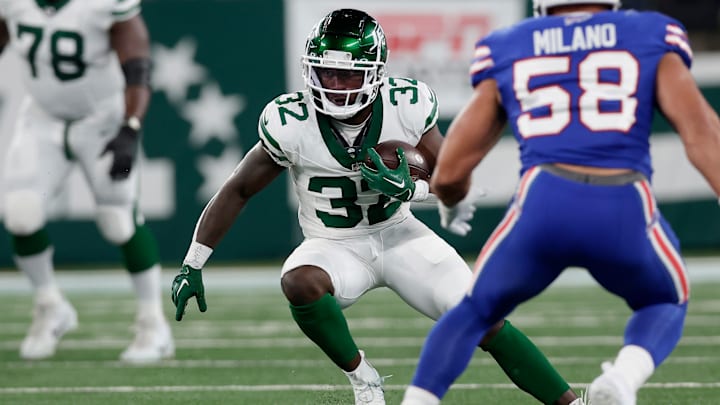The NY Jets made the surprising decision to release running back Michael Carter on Tuesday. Carter, who has primarily served as the team's third-down back this season, was benched this past Sunday following an illegal chop-block penalty in the third quarter.
It's not so much a surprise that Carter has been phased out of the offense, but few expected him to be outright released. The former fourth-round pick looked like a potential long-term building block following an impressive rookie season, but he hasn't been as effective since.
Carter averaged just 3.5 yards per carry on 114 attempts in his second NFL season and was replaced by free-agent signing Dalvin Cook entering 2023. The numbers don't look pretty this year, either.
Carter ranks dead last among all qualified running backs in Pro Football Focus grade and has struggled mightily as both a pass blocker and receiver. He was miscast as a third-down back.
Releasing him allows Carter to hopefully catch on with another team. Still, his presence in the locker room will be missed. What does this mean for the Jets moving forward, however?
How does the Michael Carter release affect the NY Jets?
The Jets will now need to find players to take Carter's third-down reps. A whopping 76 percent of Carter's snaps this season came on passing downs, which means there is an opportunity for more passing game work for the Jets running backs.
The most obvious fill-in is rookie fifth-round pick Israel Abanikanda. Abanikanda flashed in the summer but has been a healthy scratch in each game this season. That's expected to change this week.
Abanikanda could provide a much-needed burst of playmaking ability to an inept Jets offense, although there are probably better passing-down options.
Breece Hall is arguably the second-best receiving target on the field. The Jets would be wise to give Hall more reps on third down as opposed to continuously taking him off the field for the team's most important plays.
Cook has also quietly been effective the last two weeks. The four-time Pro Bowl running back ranks top five in Pro Football Focus pass-block grade and should be given more opportunities on third down as well.
In Hall and Cook, the Jets have two running backs, who are more effective on passing downs than Carter. They also have a speedy rookie in Abanikanda who offers more big-play potential than Carter.
In short, buy Israel Abanikanda stock and expect a heavier dosage of Breece Hall and Dalvin Cook on third down.
The Jets should also find ways to get Hall and Cook on the field at the same time. Perhaps the offensive tweaks head coach Robert Saleh was referring to include that.
At the end of the day, Carter is an NFL-caliber running back who should find a home on a new team. It was time for the Jets to make a change, though. This is for the best.
